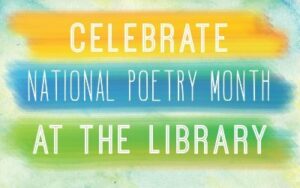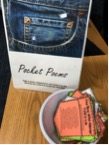Po-et-ry (noun)
Poetry. Yuck.
At least that’s what I used to think.
April is National Poetry Month. This began in 1996 and has since grown to be the biggest literary celebration in the world. Schools, publishing houses, authors, your random third cousin on Facebook, all getting pumped up over what? Poems? Weird.
 I’ve since grown out of my aversion to poetry. It happened in the same way I grew out of my aversion to asparagus: I swore up and down it was gross…and then I tried it. It was delicious. But you have to make it right.
I’ve since grown out of my aversion to poetry. It happened in the same way I grew out of my aversion to asparagus: I swore up and down it was gross…and then I tried it. It was delicious. But you have to make it right.
Poets arrange words in a unique way to make you think. There are so many ways to glean meaning from a poem. Why did the author choose this word? How does the iambic pentameter affect the way we emphasize certain syllables over others? Why does capitalizing this common noun instead of another change the way we understand the poem? It gets you to think critically—without even realizing you’re doing it.
Poets also use their words to make you feel. In fact, the point of poetry is to evoke an emotion or mood while communicating a message. The best poetry does this easily by following the writing axiom “show, don’t tell”. If through words the poet is able to evoke a memory of the feel of sunshine on your face, that is much more engaging – and more poetic – than simply telling the reader “the sun shone on my face.” And that’s where the magic takes place. When words hit you in the feelings, when the language trips off the tongue and delivers a salient message to boot – you’ve got a good poem on your hands. It’s hard to put a finger on what makes poetry “good”, but we can all spot it when it’s decidedly not.
“The purpose of poetry is to instruct and to delight,” said Elizabethan poet Sir Philip Sydney. And that is why, in the ICS Library, we celebrate poetry month. Langston Hughes used his poem Harlem (“What happens to a dream deferred?…”) to give insight into the struggle of African Americans in the middle twentieth century. Dr. Seuss used wordplay and whimsy to trick kids into enjoying reading. Emily Dickinson used it as therapy; Allen Ginsberg used it—actually, still not really sure why Allen Ginsberg used it.
My grandfather has dementia. On his worst days, he may not remember the conversation you had an hour ago or what he ate for lunch. But even on those bad days, he can always remember the very first poem he read in school
Out on the plains, where the wild wind blows
Galloping fast, the cowboy goes.
Wind at his face, rope at his side,
Galloping, galloping, see him ride.
It’s a little poem. It’s not very good. But decades later he still remembers it. When it seems like his mind is slipping away I’ll ask him to tell me the very first poem he ever read, and he rattles it off perfectly every time. Now I deeply appreciate poetry for a whole new reason—how it connects me to someone I care for.
Whether it causes you to think, whether it makes you feel, whether it helps you remember—there is just something special about poetry. We’re taking some time out to appreciate it this month in the library through some of the activities listed below. Students have been dropping in to show their creativity or enjoy someone else’s and we plan to keep it going all through the month of April! All students, parents and siblings are invited to stop in and check it out.

U DO HAIKU
Come paper the library door with your own haiku! Grab a sticky note and do your best to fit your thoughts into the famous 5-7-5 syllable layout.
 POCKET POETRY
POCKET POETRY
Grab a pocket sized poem to take home with you. Candy for anybody who is able to memorize a poem and recite it back to a librarian!
BLACKOUT (or FOUND) POETRY
Ever wanted to write something without, you know, actually having to write? Blackout poetry gives you that freedom. Grab a page from an old book and cover up any of the words you don’t want to be a part of your poem. The poem is already written, you only need to find it! The librarians actually had to rip up a library book to make this happen (gasp!), so you know it’s gotta be good.
 MAGAZINE POETRY
MAGAZINE POETRY
Take some words cut out of various magazines to concoct your own colorful, vibrant poem.
Written by ICS Librarian, Erika McKellop and ICS Library Assistant, Kristin Griffin
Click to learn more about the ICS Library.